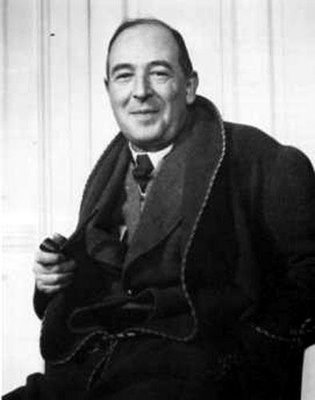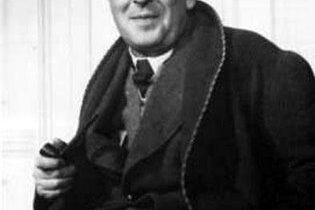C.S. Lewis, Roman Catholicism, and Bad Apologetics
 After giving his talk, the venerable old Dominican friar came and sat near me, sipped his beer, and began to ask me questions about myself. Before long, it became clear to him that I was not Catholic but Anglican. As seems almost inevitable among intelligent Catholics, the discovery that I am an intelligent Protestant with high church leanings led to the question, “But why aren’t you Catholic?” Among some (my girlfriend on our first date, for example) this is a genuine question. For others, it’s more a reaction of incredulity—it seems that some believe that any intelligent thinking person will through a process of simple syllogistic logic arrive at an understanding of the superiority of Catholicism and convert.
After giving his talk, the venerable old Dominican friar came and sat near me, sipped his beer, and began to ask me questions about myself. Before long, it became clear to him that I was not Catholic but Anglican. As seems almost inevitable among intelligent Catholics, the discovery that I am an intelligent Protestant with high church leanings led to the question, “But why aren’t you Catholic?” Among some (my girlfriend on our first date, for example) this is a genuine question. For others, it’s more a reaction of incredulity—it seems that some believe that any intelligent thinking person will through a process of simple syllogistic logic arrive at an understanding of the superiority of Catholicism and convert.
Which brings us to C.S. Lewis, because the venerable old Dominican brought him up as an admirable Christian thinker. And, reflecting the attitude I experience towards myself, he expressed his puzzlement at how such a great thinker (certainly greater than I am, I hasten to add) could have remained Protestant.
The answer he gave was that Lewis was simply prejudiced by being a northern Irish Protestant.
The idea that C.S. Lewis is obviously so Catholic that it’s a puzzle as to why he didn’t actually become Catholic is something I’ve seen before. It’s not an unreasonable question since Lewis was himself converted in part by his very Catholic friend J.R.R. Tolkien.
Yet, a large part of this surprise in Catholic readers at Lewis not being Catholic comes not from that biographical detail but from the many ways they see their own doctrine reflected in him. And, almost always I see the answer given that the reason he didn’t become Catholic was because he was an Ulsterman.
Part of the problem here is the way in which Catholics often stereotype Protestants: Protestants are some mixture of Luther and modern fundamentalism—they are unanimously and solely defined by sola fide, sola scriptura, sola gratia, completely non-sacramental, and probably a bit anti-intellectual. When this is what you think all Protestants are, then of course Lewis would look highly Catholic. Yet, much of what looks Catholic in Lewis is strongly part of Anglican patrimony going back at least to the Oxford Movement and often back High Churchman like Richard Hooker and the Caroline Divines. Anglicans aren’t Baptists, and the fact that Lewis doesn’t look like a Baptist doesn’t mean he’s a shoe-in for being Roman Catholic.
More troubling, though, is the implication that because Lewis looks Catholic in many ways the only possible reason he wasn’t Catholic was that he was a bigot. Lewis was a far from perfect individual so there’s no reason cultural bigotry would have been impossible for him, but it’s also an accusation that makes it easy to write off Lewis and ignore what he might actually have been saying.
Throughout his career Lewis stressed that he was not a theologian, that he was presenting an apologetic for Christianity to a culture that was moving away from that faith. What Lewis set about to defend was “mere Christianity.” It was not that Lewis believed one could be a mere Christian, he held it to be important to be part of a Church denomination, but he did believe that this ecumenical identity was the most important thing to be said about Christianity. It was what made Christianity a plausible world story, not the particular claims of a given church. If Lewis made reference among his friends to the fact that he couldn’t become Catholic because he was an Ulsterman, might this not have more to do with his commitment to mere Christianity and the way this contrasted with the extreme sectarianism he saw in the Roman Catholic Church in his native Ireland than mere prejudice? This seems a more plausible explanation given that he was a man who had many Catholic friends and many more Catholics with whom he corresponded.
So why does this matter? Lewis’s “mere Christianity” might not be a viable vision of ecclesiology on historical doctrinal grounds, but it is a very reasonable vision of the church and one which has gained a lot of traction in the Protestant world since Lewis proposed it. Yet, many Catholics would rather write off Lewis’s actual understanding of the world than engage it. It’s more comfortable for them to think that their views are so obvious and secure that any thinking person should obviously become Catholic. Yet, the realities of how we come to belief are far more complicated than that, and the reality is that while there is one true story of the world, many plausible stories can be told and it isn’t a simple thing to decide between them which one is that true story. We all come with a mixture of reason, experience, and imagination by which we wrestle with this question. Those who assume it is otherwise approach evangelism and apologetics with an attitude that does nothing but bolster the self-assurance of those on the inside and utterly fails to reach those who are supposedly being reached. They assume that a brilliant man like Lewis obviously would have been Catholic if he’d just been clear eyed like them, and so they fail to present a case for Christianity that actually compels. This is a lesson not just for Catholics, but for all of us who seek to share the good news of Jesus Christ with the world. Moreover, it is a lesson C.S. Lewis knew well—he is known as a reasonable apologist, but he himself never sought to appeal to mere cold reason, but rather to the whole of the human spirit, and that is why his works stand the test of time while so many others fall to the wayside.
Kevin G.
Latest posts by Kevin G. (see all)
- All the Company of Heaven: Praying to the Saints - October 31, 2016
- C.S. Lewis, Roman Catholicism, and Bad Apologetics - August 1, 2016
- Sabbath and the End of Work - May 24, 2016

